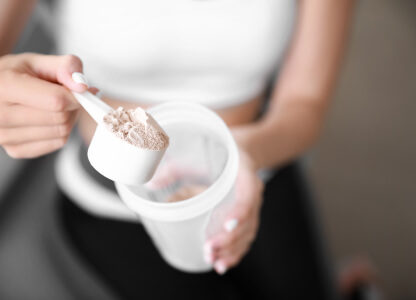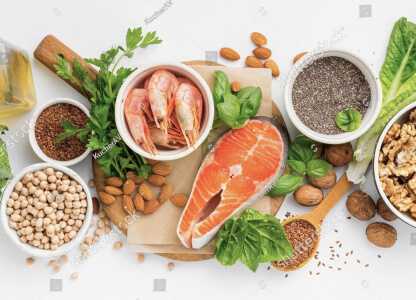Nutrition for soccer players: eat and drink to win

Soccer may as well be one of the most popular sports in the world, with fans of the sport watching it and playing it.
Soccer can be considered an “intermittent aerobic sport” – it alternates periods of high-intensity exercise with periods of medium-low intensity exercise, like walking and standing still. The game is divided in two 45-minute halves, with a period of 15 minutes as a half-time break, with players covering around 10-13 km during the game. It’s key to note that players usually play at a lower intensity during the second half and tend to cover less distance. Players tend to spend up to a fifth of the time doing high intensity sprinting; the rest of the time is usually spent at moderate intensities.
What sets soccer apart from other sports is that the actions done at a high intensity influence the match the most, therefore, players need to be properly fueled and their fatigue minimized.
Proper nutrition for soccer players will be unique to every member of a team, depending on various factors, like their sex, and their position in the field.
Male and female players experience similar levels of physiological stress and require similar skillsets, but the key differences between them are that women tend to cover about a third less distance, but at higher intensity than men. Goalkeepers may require up to 600 calories a day less than outfield players.
However, many soccer players lack knowledge on proper soccer nutrition strategies, eating similarly to ordinary people, or undereating carbs and prioritizing protein. Therefore, we’ve compiled a handy guide to a healthy diet for soccer players.
Fueling player needs - carbohydrates
Players can burn anywhere from 1200 to 1500 calories in a match, with the bulk of the energy coming from muscle and liver glycogen stores. However, the mixed intensities also allow players to use fats as an energy source. Therefore, soccer players require a high carbohydrate intake, around 7-10g/kg of their body weight during moderate and low intensity training, and up to 12g/kg of body weight on match and high load training days.
For female athletes, is it essential to ensure that they are getting over 45 calories per kg of fat-free mass (FFM) per day, as that ensures that the body has enough energy. If the energy intake falls under 30kcal/FFM, especially for a long time, the risk of developing hormonal issues and increased risk of problems with bones. Therefore, a diet plan for female soccer players should keep this in mind.
Carbohydrates should be provided during the game to replenish glycogen stores as the game goes on. They should also be consumed straight after the game.
It’s important to remember that certain types of muscle fibers can’t restore their glycogen reserves even 48 hours after a game, meaning that fueling properly after training and a long recovery period is necessary.
Keeping the body strong - protein
Female athletes should consume around 1.2-1.4g/kg of protein a day, with special care taken to ensure that the amino acid composition of the proteins consumed remains balanced. Incorporating enough leucine is also important, as it has been suggested to be vital for building muscle.
For athletes who are vegan or vegetarian, ensuring that they’re getting enough protein might be trickier, as they will need to consume more foods, as plant proteins tend to have a different amino acid profile. Therefore, diets for soccer players should include a variety of plant proteins.
For all athletes, the timing and amount of protein eaten with each meal or snack are most important for boosting muscle synthesis, so aim to eat similar amounts of protein every three to four hours.
Remembering the fatty acids
Consume an adequate amount of fat, with the recommendation being that around 20-35% of daily calories should come from fat in a soccer player diet. As fats provide energy, fatty acids, and help with absorbing fat-soluble vitamins, it’s important not to let fat intake drop lower than 15% of daily calories. Consuming fats that are polyunsaturated, like omega-3, is especially important in order for the body to reduce inflammation and improve heart muscle’s oxygen intake.


Ensuring enough water
Soccer players need to ensure that they are drinking enough, as the game allows few water breaks. Dehydration may decrease performance. Therefore, it is essential to go into a game well-hydrated and keep drinking throughout, when possible, as it has been noted that many players start playing a match without adequate water intake. It’s also essential to replenish the ions in your body, electrolytes, especially for those that tend to sweat a lot, as this can help prevent cramping.
Your soccer nutrition plans must ensure constant quality hydration.
Supplementing for success
Many players supplement different things, so it might get confusing on what the best supplements for soccer players are. To support a healthy soccer diet, you can rely on micronutrient supplements if you’re not getting enough.
Best supplements for soccer players to ensure you stay healthy and on top of your game:
- Iron – iron is essential for carrying oxygen in the blood, and those that suffer from deficiency tend to have a decreased performance and feel tired. Increase your iron levels by getting high-iron foods, pairing them with vitamin C for better absorption, or considering a supplement like Maxler Iron 25mg caps. These vegan capsules contain your daily iron dose in a bioavailable form that won’t cause gut issues.
- Calcium – calcium keeps the bones and muscles healthy, and helps to pass on nerve signals, and is especially important in hot environments. Therefore, consider supplementing with Maxler Calcium Citrate, which provides 15mcg of calcium per serving, alongside vitamin D for better absorption.
- Vitamin D – many soccer players may be deficient in vitamin D, which is essential for bone and muscle strength, and lessens the chances of stress fractures in female athletes. Maxler Vitamin D3 contains your daily dose of vitamin D and extra calcium to ensure bone health.
- Omega 3 – omega 3s can help to decrease fatigue and muscle soreness, aid in recovery and even cognitive function. Try Maxler Omega-3 Premium soft gels, which have a citrus flavor and provide 600mg of omega-3s.
- Collagen – collagen makes up joints and cartilage, and so is useful as a supplement to reduce risk of injury, especially in women before their ovulation phase, as estrogen decreases collagen production. Try Maxler 100 % Collagen Hydrolysate which is unflavored and provides pure collagen in each serving, or Collagen Hydrolysate which provides collagen with vitamin C and has great fruit flavors.
- Electrolytes – it’s important to replenish ions lost through sweat, so electrolyte solutions help you do just that while making absorbing the water easier. Combining these with a carbohydrate source can be useful in recovery. Try Maxler Electrolyte Powder which is vegan and contains essential ions in a convenient form.
- Whey protein – whey protein is a great supplement for after your training, as it can help with recovery due to being easily digestible and high in leucine. Take 0.3-0.4g/kg of bodyweight during the two hours straight after the workout. Try Maxler 100% Golden Whey – a flavorful, gluten-free whey powder packing 25g of protein per serving.
- Casein – casein has been suggested to be a great protein to take as a snack before bedtime. Having 40g before going to sleep will help to provide your body with enough amino acids to continue building muscle overnight, as casein is a slow-release protein. Consider Maxler Golden Casein, which packs 23g of protein and 2046 mg of leucine per serving.
- Curcumin – if you’re looking to give your body an extra hand in recovering, try curcumin. Curcumin is a compound found in turmeric and has been suggested to reduce inflammation and improve performance in sports players. Maxler Turmeric Curcumin with BioPerine is an effective vegan formula providing anti-inflammatory curcumin in a convenient tablet form.
- Multivitamins – A study has suggested that during pre-season, the diet of soccer players is different than that during the playing season, and may lack enough vitamin C, E, folate, vitamins B, and magnesium. Therefore, consider a multivitamin like Maxler VitaMen and VitaWomen during your pre-season, to ensure you’re getting all the necessary nutrients to stay in shape.





